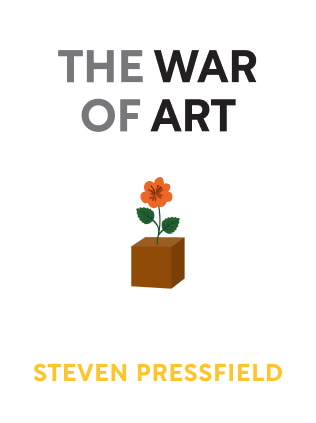

This article is an excerpt from the Shortform book guide to "The War of Art" by Steven Pressfield. Shortform has the world's best summaries and analyses of books you should be reading.
Like this article? Sign up for a free trial here .
What is Steven Pressfield’s idea of resistance? How does resistance hold back creative people from achieving their ambitions?
According to Steven Pressfield, resistance is the reason many people don’t achieve their dreams. Resistance is anything that stops you from taking creative action, including inner fears, procrastination, and self-doubt. In The War of Art, Pressfield explores the idea of resistance and tells you how to overcome it.
Find out more about Steven Pressfield’s resistance concept below.
Steven Pressfield on Resistance and Creativity
What’s stopping you from fulfilling your dreams? Is it time, family, motivation, fear, or one of several distractions you face on a regular basis? In The War of Art, Steven Pressfield says it’s all of these things and places them under one umbrella—resistance. Although the book mostly discusses resistance surrounding creative pursuits, the book speaks to anyone trying to attain personal growth and satisfaction in their life by following their heart’s desire.
Pressfield breaks down the enemy within that holds you back from reaching your potential, how to reframe your pursuits for success, and how to tap into your creative power. Understanding resistance and how to push past it is important not only to honor the genius you were born with, but also to ensure you don’t spiral into a state of dissatisfaction with yourself and life.
What Is Resistance?
Resistance is an internal sensation that is more powerful than any external force in stopping you from achieving your goals. It’s the little voice in your head that says you aren’t good enough, strong enough, or motivated enough to start your creative journey. It is a faceless, formless, and heartless energy with the sole purpose of ensuring you never start the work that will lead to your true nature. Whether you’re an artist, inventor, or scientist, resistance flares up each time you start or think about starting the work you were born to do. If left unchecked, resistance will lead you down a road of psychological instability.
Resistance is activated by fear and gains strength every time you give in to that fear. Resistance takes on many forms: procrastination; a fixation with self-soothing or instantly gratifying behaviors, such as drug and alcohol use or entertainment; or a gravitation toward trouble or drama in your life, since they help distract your mind from the important work. Resistance manipulates you by providing what you need to continue avoiding the work you know you must do.
We all have a part of ourselves that is unrealized—a dream or calling that encompasses our true selves. But many of us struggle to live those authentic lives. What stops us is something called resistance. According to Steven Pressfield, resistance is the enemy of achievement. Artists who don’t create art, innovators who don’t innovate, and healthy people who live unhealthy lives are all losing their battles with resistance.
Resistance is a toxic force and the cause of many negative psychological issues. When you lose the battle with resistance, you likely experience some form of depression, discontent, and unhappiness as a result.
Like everyone else, you have genius inside you. Genius is Latin for “inner-guiding spirit.” Your spirit is the force that encompasses your truest self. It is the voice inside that tells you what your true calling is. Your unique brand of talents and desires, whether you are a writer, fashion designer, or scientist, is your spirit. When you don’t act on that spirit, you are giving in to resistance.
Many have fallen before you under the weight of resistance, and many will fall after you. The sad part is that you likely won’t know that it’s resistance holding you back.
Think of someone who is diagnosed with terminal cancer. With nothing left to lose, he finally does all the things his heart has always desired. He starts a travel blog, takes up painting, volunteers at a homeless shelter, or starts a non-profit for runaways. He is happier than he’s ever been because he is finally living his dream.
You don’t want to wait for the prospect of death to move you to follow your heart’s desire. You must learn to wage war against resistance if you want to accomplish your dreams.
The Characteristics of Resistance
The following principles regarding resistance will help you understand what it is and where it comes from. When you understand these principles, you can learn to push past resistance.
Principle 1: Resistance has no form.
- None of your senses will detect resistance. It is not tangible. Resistance is a deflecting force. Its sole purpose is to repel you from fulfilling your potential.
Principle 2: Resistance is not an external force.
- You may think outside sources are the obstacles to success, but this is not true. Resistance is an enemy existing inside you. You create it and perpetuate it, regardless of external struggles.
Principle 3: Resistance is cunning.
- Resistance is the most formidable opponent you will encounter. It manipulates, lies, and deceives you anyway it can. It will present argument after argument for why you should not follow your instincts or dreams. It is a conman with one goal—to stop you from succeeding.
Principle 4: Resistance is unyielding.
- When you live with resistance, you live in a totalitarian world. Resistance is a tyrannical dictator that cannot be persuaded and shows no mercy. It will never stop doing what it can to thwart your endeavors because it doesn’t know how to stop. You can only aim to overcome it on a day-to-day basis.
Principle 5: Resistance doesn’t discriminate.
- Who you are and what you have been through is superfluous to resistance. Its attack against you is not personal or motivated by malice. Resistance is like a tornado—a powerful force that destroys whatever is in its path.
Principle 6: Resistance is a compass.
- Think of a compass needle that is magnetized to always point North. Resistance is that compass needle. It will always point in the direction of your most significant calling. You can use this unwavering accuracy to your advantage. Whatever you feel resistance toward is exactly what you should go after. The appearance of resistance tells you the goal is important to your true spiritual fulfillment.
Principle 7: Everyone experiences resistance.
- You are not alone in your struggle with resistance. Anyone with a soul experiences resistance.
Principle 8: A war with resistance is a battle to the death.
- Resistance doesn’t play nicely. Its aim is not to merely distract you or throw a wrench in your plans. Resistance is out for blood. It wants to destroy your genius and ensure you never succeed. Knowing this will help prepare you for the fight.
Principle 9: You give resistance its power.
- Resistance is not a foreign body implanted inside you. You give birth to resistance through fear. When you feel a pull toward your true calling, you feel fear. Resistance uses that fear as sustenance, and the more you give in to your fears, the more powerful resistance becomes. (We’ll cover fear in detail in Chapter 5.)
Principle 10: You only feel resistance on the rise.
- You will only feel resistance when you attempt to seek a higher version of yourself (your true self), whether through enterprise, spirituality, or creative expression. If you pursue goals that don’t feed your spirit, you will feel no resistance because there is nothing personal to gain or lose. There is no fear.
Principle 11: The last hurdle is the hardest to cross.
- When you reach the point in which your dreams become a reality, resistance doubles down on its attack. Resistance is the most powerful when you are about to defeat it. Be ready for this final surge of power, and double your resolve against it.
Principle 12: Resistance uses reinforcements.
- Although resistance is self-made, your efforts to defeat it may cause trouble in your external life. The people around you will notice a change in you. That change will appear as achievement or fortitude as you pursue your true calling. If others are losing their own battles with resistance, they may resent your success in defeating yours and become allies with resistance. Their efforts to make you feel bad or guilty about succeeding can weaken your drive, thereby strengthening your resistance.
Targets of Resistance
Resistance is only activated by pursuits that gratify your higher calling and lead to long-term growth and good health. Some examples of these types of pursuits are the following:
- Any creative art: writing, dance, film, music, visual art, and performance art
- Entrepreneurial endeavors, such as a new business venture, an invention, or a non-profit organization
- Health pursuits, like diets or workout regimens
- Spiritual or religious awakenings
- Activities aimed to break habits or overcome addiction
- Educational pursuits
- Social and political action, especially those motivated by moral or ethical values
- Philanthropic endeavors
- Personal and emotional growth, including commitments to relationships
- Behaviors that oppose adversity, especially those requiring courage
An example of how resistance differentiates between higher and lower callings is the life of Adolf Hitler. Hitler wanted to be a painter and architect. He applied to art school, but the resistance standing between him and his goal was too great. He struggled with criticism and was scared to put his dreams on the line. In the end, it was easier for Hitler to start a world war and oppress an entire population than go through the pains of committing to his art.
You’ve learned about what resistance is and how to recognize it in your life. You’ve also learned the consequences of allowing resistance to guide your behaviors. But there are other ways in which resistance influences you. The following section provides a more comprehensive understanding of how resistance shows up in your life.
Signs You’re Facing Resistance
As opposed to the behavior symptoms presented in the above section, these symptoms all present as attitudes founded in emotion.
Criticism of Others
When you criticize others, it’s a good indication that resistance is strong in your life. You may feel envious of people who are living their dreams and attempt to tear them down. This behavior only masks how scared you are to begin your own journey. Resistance is a personal sensation, but it can cause you to harm other people. Be careful of moments when you feel the need to criticize others. Likely, the problem is with you, not them.
If you are working within the power of your true spirit, you have no reason to feel threatened or offended by another’s success. You understand how hard it is to push past resistance and follow your dreams, so you provide encouragement, not criticism.
Self-Doubt and Fear
Any artist following their calling is going to experience doubt about their talents. The little voice in your head saying you’re not good enough is resistance. But you can use that voice to empower yourself.
Doubt is a sign that something is important to you. When you express doubt, you’re signifying your passion about reaching your potential. If you ever wonder whether you’re really an artist, know that the answer is yes. Imposters tend to be overconfident because their souls are not on the line. True artists have everything to lose. If you experience doubt, it’s a good sign that you’re on the right track to your heart’s desire.
Likewise, fear is a huge indication that you’re headed toward personal growth. Fear can be tricky because, as mentioned, it activates resistance and gives it strength. But you can counteract the relationship between fear and resistance by using fear as a guide. As a general rule—the more you fear the work, the more you should pursue it.
Many actors only take roles that scare them. They do this because these roles challenge their abilities and push them out of their comfort zones. They see an opportunity to grow and get closer to their full potential. The same is true for you. You feel so much resistance when you’re scared to pursue something because the work means something to you. If it didn’t, you’d feel no resistance. Use your fear to propel you forward because the deeper parts of yourself and talent lie on the other side.
Vulnerability
Like doubt and fear, you only feel vulnerable when your heart is on the line. When you feel a deep emotional connection—something akin to love— to the work, failure feels visceral. Therefore, you feel vulnerable, and feeling vulnerable is uncomfortable. Resistance uses that feeling to drive you away from your work.
When you’re overwhelmed by resistance, you know you’re doing something you love. The joy and satisfaction you feel when you accomplish your goal will be immense because of how much you love it.
The antithesis of love is indifference, not hate. If you don’t love the work you’re pursuing, it’s probably not the right work for you.
Misplaced Priorities
Resistance will distract you with grandiose ideas about rewards and status. You must ignore those ideas—they are false motivators.
A true artist understands that work is required for success. There is no way around it. So when grand ideas enter your process, accept them as resistance and push forward with the hard work. The joy you find in the work is what will help you reach the potential, not external commendations.
Leaning on Others
Resistance makes you believe you need motivation to start your work. It tells you that you must get support from others to achieve that motivation. Therefore, you spend time and energy attending conferences and workshops, reaching out to loved ones, and discussing your fears with colleagues. None of that time is you sitting down to do the work.
We all need support from family and friends. But the work has to come from you, regardless of how much or little support you have from your personal network. If you wait to start your work until you have a suitable amount of encouragement, resistance is winning.
The Power of Rationalizations
When you rationalize something, you are trying to justify your choices. Imagine what resistance could do with that! In fact, rationalization is the operational mode of choice for resistance.
Resistance is fear, as you’ve already learned. But if you only felt fear, you might recognize it as such and maybe start to feel ashamed for letting it get in your way. That shame could be enough motivation to jump start your work. Resistance can’t have that, so it presents you with rationalizations to push you farther away from the work you’re afraid to start.
You can justify not starting your work for a number of reasons. The day job takes up too much time. The kids need your attention. Whatever it is, you rationalize that it’s simply too hard for you to start your work now, so you put it off for a more convenient time. What makes the situation worse is that those rationalizations are valid. You may have a lot of “real” work, and you might have children. But those things are not what’s stopping you from following your calling. Fear is.
Don’t buy into the rationalizations. You always have the power to make art, even if it’s after the kids are in bed.
Overcome Resistance
Perhaps you believe never achieving your true calling is not a big deal. You’ve found a way to be content with life, so why rock the boat? You may think you’re content, but what you don’t realize is that allowing resistance to have power in your life eventually leads you down a path to profound unhappiness.
For Steven Pressfield, Resistance is like a bully. Like all bullies, it feeds on the fear of its target. The more you cower in the face of resistance, the stronger it becomes and the more frequently it will pester you. When you are a professional, you take that power away by standing your ground, sitting down, and doing the work each day. You refuse to have your lunch money stolen and get shoved into another locker. You look resistance in the eye and say, “give me your best shot.”
A bully doesn’t know what to do when their target stands up to them. They suddenly have no more hold over their weaker opponent. Resistance also doesn’t know what to do when you ignore its efforts to derail you. When you refuse to back down in the face of resistance, you become stronger and more persistent than resistance. You’ve defeated the bully. You will gain confidence in your strength. You will know that you don’t have to be afraid anymore.
There is no special formula to follow to become a professional. Make the decision to turn pro, and just like that, you’ll be one.
The only thing you have to do to win the battle against resistance is do the work. The work is where your creative power lives. You fall into a timeless space where the rest of the world drops away. You are alone on your creative island, and only you have access to this part of yourself. The person you show the world is not the person working with your internal genius.
To reach this creative space, you must be a professional in your work, not an amateur. When you’re an amateur, you dabble in your art whenever inspiration strikes or you’re in the right mood. You’re not committed to your art, and your goals center around fun, money, and status. Resistance loves an amateur because you are easily distracted from the work.
When you’re a professional, you create art because your soul demands it. Your art is a full-time commitment, even if you aren’t getting paid. You sit down to face your art daily because it is part of who you are. You shape your life to include the work as a priority. Resistance hates the professional because you are less likely to cower to fear.
The great thing about being a professional is the access you have to your muse. Each time you sit down and face your art, you open the portal to your artistic space, where the muse resides. Within this universe, your muse conspires to bring you inspiration because you are committed to your art.
The article above explains Steven Pressfield’s resistance concept and how it impacts creativity. According to Steven Pressfield, resistance must be overcome in order to be a successful artist.

———End of Preview———
Like what you just read? Read the rest of the world's best book summary and analysis of Steven Pressfield's "The War of Art" at Shortform .
Here's what you'll find in our full The War of Art summary :
- Why creative people feel resistance when approaching their true work
- How to break down the wall that holds you back from reaching your potential
- How to tap into your creative power and honor the genius you were born with






